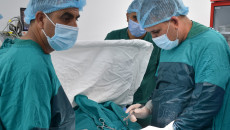Shakir Ali's two-year-old child's skin is red, constantly itching and pouring his frustration on the family. Ali's family is at loss, does not have easy access to public, free health services and for each doctor's visit has to spend money that they cannot afford.
Ali, 31, has been displaced by the fighting between the Islamic State of Iraq and the Levant (ISIL) for 11 years.
“My child's whole body is reddening and we have to treat him, but our problem is that we have to go outside the camp for 30 minutes for each doctor's visit.”
“When I arrived in Zakho, there were no doctors in the government hospitals, so I had to go to an evening clinic where the cost of treatment and medicine is more expensive. So far we visited the doctor three times and costed me over 200,000 Dinars (USD140)
I had to go to an evening clinic where the cost of treatment and medicine is more expensive
The only health center in the camp for the Internally Displaced Persons IDP where Ali’s family lives was completely closed in December 2023. Since then, the IDPs have been forced like Ali to depend on private health services, despite the families' poor financial conditions and hardships of finding jobs.
“There are people who do not have cars so have to pay for transportation as well, in addition to buying medicines, tests and treatment,” Ali said.
Only seven of the 21 health centers in the 16 IDP camps in Duhok northern province are still open , after that aid organizations terminated their funding for the IDP camps, while according to statistics, there are still about 190,000 IDPs in the province.
Bersiv 2 camp, where Ali's family lives, is still home to 7,660 IDPs in, without any health facilities.
Iraq’s healthcare system which was once one of the most advanced in the region now is in serious crisis. There’s a shortage of drugs, buildings and the medical staff to administer it. Over the past three decades the country has been ravaged by Iraqi-Iran war, Saddam Hussein’s invasion of Kuwait, ousting of Saddam regime followed by sectarian violence, the war against al-Qaeda and the rise of Islamic State in Iraq and Syria ISIS.
The political chaos after 2003, pushed an estimated 15,000 out of 52,000 registered Iraqi doctors to leave the country. The young student doctors primarily seek training and life abroad rather than permanent state employment.

Duhok: Khanke Camp Health Center. Ammar Aziz
There is a strong link between the provision of health services to IDPs and international aid organizations working in Iraq, which have been funding part of the medical needs of the IDPs.
"Most of the international organizations have withdrawn and we can no longer afford to continue these health centers, so only six to seven health centers remain," Afrasiab Musa, director general of health in Duhok province, told KirkukNow.
“The only solution is for two camps near each other, there is only one health center left, and those who are close to the cities should go there for treatment,” he added.
“We know it is a burden, but there is no other solution... Beside the closure of these centers, there is a lot of pressure on our hospitals.”
There is a lot of pressure on our hospitals
According to Duhok health statistics, 40 % of those who visit government hospitals and health centers are IDPs.
According to the Kurdistan Regional Government (KRG), there are over 960,000 IDPs in the region which their health services requires a budget of over two million dollars day.
The Iraqi Ministry of Migration and IDPs has repeatedly set the date for the closure of IDP camps across Iraq, but each time and for reasons extended, as there is a dispute between the two governments of Iraq and the KRG.
KRG Interior Ministry officials have repeatedly stressed that they cannot force the IDPs out and demanded guarantees to protect their lives in terms of security upon their return.
Most of the IDPs do not want to return because of the lack of security, stability, proper public services and the devastation caused by the war against ISIL.
Pir Dayan Jaafar, director of the KRG's Migration and Crisis Response Office, told KirkukNow that health centers remain only in IDP camps far from the cities.
“The closure of the camps has been directed to the relevant authorities, but there is no satisfactory effort to resolve the issue,” Jaafar added.
There is no satisfactory effort to resolve the issue
"The issue is not only the health sector, other sectors are facing the same problems, including garbage collection, electricity supply, water and education issues, what is available now is provided by the Kurdistan Regional Government.”
Jaafar stressed that what they as the government can do is to treat the IDPs in the health centers in the city like any other citizen of the Iraqi Kurdistan Region IKR.
The Iraqi government has increased the financial assistance to families returning to their homes from 1.5 million Iraqi dinars IQDs to 4 million IQD, in addition to providing household items and other benefits such as employment and social welfare salaries.
Another health problem faced by the IDPs is that even those health centers that are still operating in the camps do not have enough medicines and specialists.
Khalida Shamo, a resident of Khanke camp, said, “I have not been to the health center in the camps for more than six years because there are no specialists.”
Although the director general of health in Duhok says the IDPs should not be optimist about reopenning these centers again, but Ali wondered, "How can more than 1,000 families are deprived of health services?”





